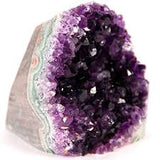Amethyst
Amethyst is a violet variety of quartz. The name comes from the Koine Greek amethystos, "not" and methysko /methyo, "intoxicate", a reference to the belief that the stone protected its owner from drunkenness.
Amethyst is the purple variety of the quartz mineral species.  It’s the gem that’s most commonly associated with the color purple, even though there are other purple gems such as sapphire and tanzanite. Its purple color can be cool and bluish, or a reddish purple that’s sometimes referred to as “raspberry.”
It’s the gem that’s most commonly associated with the color purple, even though there are other purple gems such as sapphire and tanzanite. Its purple color can be cool and bluish, or a reddish purple that’s sometimes referred to as “raspberry.”
 It’s the gem that’s most commonly associated with the color purple, even though there are other purple gems such as sapphire and tanzanite. Its purple color can be cool and bluish, or a reddish purple that’s sometimes referred to as “raspberry.”
It’s the gem that’s most commonly associated with the color purple, even though there are other purple gems such as sapphire and tanzanite. Its purple color can be cool and bluish, or a reddish purple that’s sometimes referred to as “raspberry.” Amethyst’s purple color can range from a light lilac to a deep, intense royal purple, and from brownish to vivid. Amethyst also commonly shows what is called color zoning, which in the case of amethyst usually consists of angular zones of darker
Amethyst’s purple color can range from a light lilac to a deep, intense royal purple, and from brownish to vivid. Amethyst also commonly shows what is called color zoning, which in the case of amethyst usually consists of angular zones of darker to lighter color.
Zodiac sign: Aquarius Birthstone: February Other: One of the emblems of the twelve apostles.
History
Amethyst was as expensive as ruby and emerald until the 19th Century, when Brazil’s large deposits were discovered. It was believed to prevent intoxication—amethystos means “not drunk” in ancient Greek. Today, as the most valued quartz  variety, amethyst is in demand for designer pieces and mass-market jewelry alike, and its purple to pastel hues retain wide consumer appeal.
Fine amethysts have been set in religious jewelry and royal crown jewels for ages. It was once considered equal in value to ruby, emerald, and sapphire. It’s no wonder that fine amethyst adorns the fingers of bishops as well as the coronation regalia of British royalty.
variety, amethyst is in demand for designer pieces and mass-market jewelry alike, and its purple to pastel hues retain wide consumer appeal.
Fine amethysts have been set in religious jewelry and royal crown jewels for ages. It was once considered equal in value to ruby, emerald, and sapphire. It’s no wonder that fine amethyst adorns the fingers of bishops as well as the coronation regalia of British royalty.
 variety, amethyst is in demand for designer pieces and mass-market jewelry alike, and its purple to pastel hues retain wide consumer appeal.
Fine amethysts have been set in religious jewelry and royal crown jewels for ages. It was once considered equal in value to ruby, emerald, and sapphire. It’s no wonder that fine amethyst adorns the fingers of bishops as well as the coronation regalia of British royalty.
variety, amethyst is in demand for designer pieces and mass-market jewelry alike, and its purple to pastel hues retain wide consumer appeal.
Fine amethysts have been set in religious jewelry and royal crown jewels for ages. It was once considered equal in value to ruby, emerald, and sapphire. It’s no wonder that fine amethyst adorns the fingers of bishops as well as the coronation regalia of British royalty.
Metaphysical
Because of its wine-like color, early Greek legends associated amethyst with  Bacchus, the god of wine. Other legends reflected beliefs that amethyst kept its wearer clear-headed and quick-witted in battle and in business affairs. Because amethyst was associated with wine, it was believed that wearing amethyst prevented drunkeness.
Bacchus, the god of wine. Other legends reflected beliefs that amethyst kept its wearer clear-headed and quick-witted in battle and in business affairs. Because amethyst was associated with wine, it was believed that wearing amethyst prevented drunkeness.
 Bacchus, the god of wine. Other legends reflected beliefs that amethyst kept its wearer clear-headed and quick-witted in battle and in business affairs. Because amethyst was associated with wine, it was believed that wearing amethyst prevented drunkeness.
Bacchus, the god of wine. Other legends reflected beliefs that amethyst kept its wearer clear-headed and quick-witted in battle and in business affairs. Because amethyst was associated with wine, it was believed that wearing amethyst prevented drunkeness.




